Serving 402 students in grades Prekindergarten-6, Otis Elementary School ranks in the bottom 50% of all schools in Massachusetts for overall test scores (math proficiency is bottom 50%, and reading proficiency is bottom 50%).
The percentage of students achieving proficiency in math is 35-39% (which is lower than the Massachusetts state average of 41%). The percentage of students achieving proficiency in reading/language arts is 30-34% (which is lower than the Massachusetts state average of 44%).
The student:teacher ratio of 13:1 is higher than the Massachusetts state level of 12:1.
Minority enrollment is 79% of the student body (majority Hispanic), which is higher than the Massachusetts state average of 47% (majority Hispanic).
Quick Stats (2025)
- Grades: Prekindergarten-6
- Enrollment: 402 students
- Student:Teacher Ratio: 13:1
- Minority Enrollment: 79%
- Overall Testing Rank: Bottom 50% in MA
- Math Proficiency: 35-39% (Btm 50%)
- Reading Proficiency: 30-34% (Btm 50%)
- Science Proficiency: 21-39% (Btm 50%)
- Source: National Center for Education Statistics (NCES), MA Dept. of Education
School Overview
Otis Elementary School's student population of 402 students has stayed relatively flat over five school years.
The teacher population of 31 teachers has grown by 14% over five school years.
Grades Offered
Grades Prekindergarten-6
(offers virtual instruction)
(offers virtual instruction)
Total Students
402 students
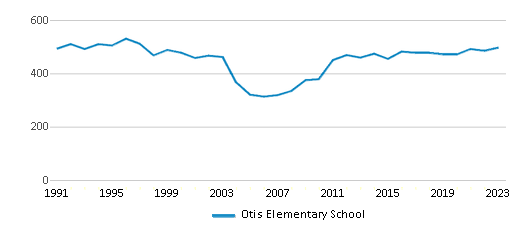
Gender %
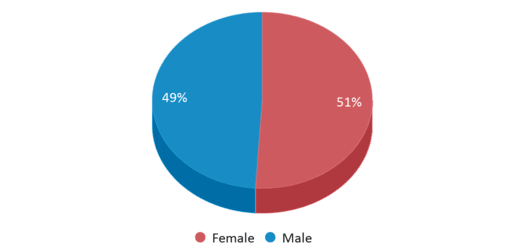
Total Classroom Teachers
31 teachers
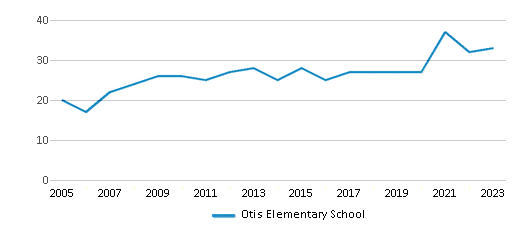
Students by Grade
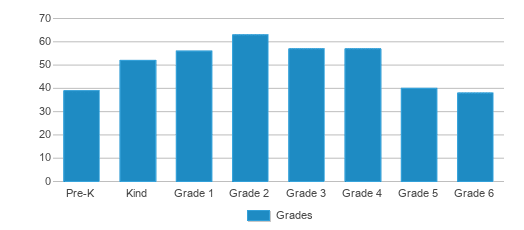
School Rankings
Otis Elementary School ranks within the bottom 50% of all 1,631 schools in Massachusetts (based off of combined math and reading proficiency testing data).
The diversity score of Otis Elementary School is 0.43, which is less than the diversity score at state average of 0.65. The school's diversity has stayed relatively flat over five school years.
Overall Testing Rank
#1029 out of 1631 schools
(Bottom 50%)
(Bottom 50%)
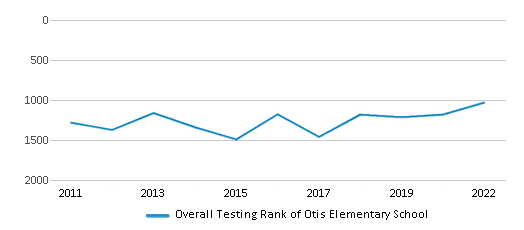
Math Test Scores (% Proficient)
35-39%
41%
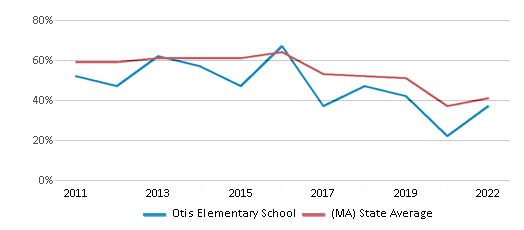
Reading/Language Arts Test Scores (% Proficient)
30-34%
44%
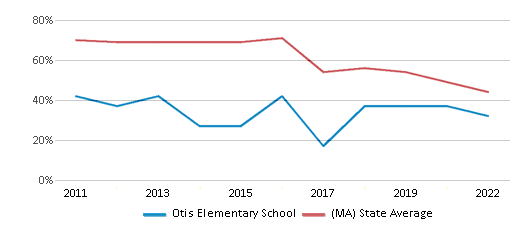
Science Test Scores (% Proficient)
21-39%
44%
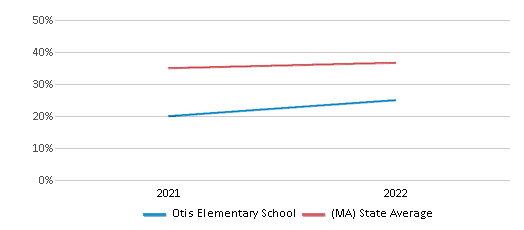
Student : Teacher Ratio
13:1
12:1
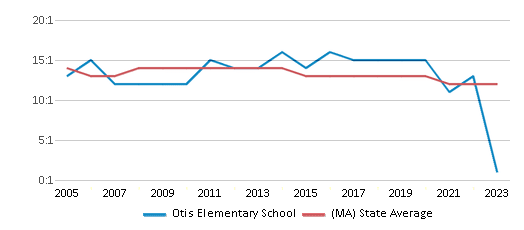
American Indian
n/a
n/a
Asian
2%
7%
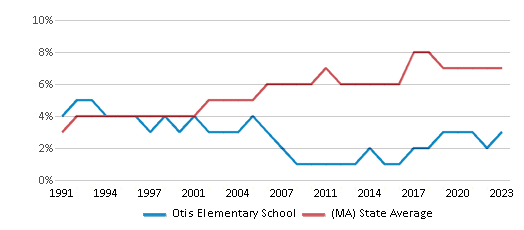
Hispanic
73%
25%
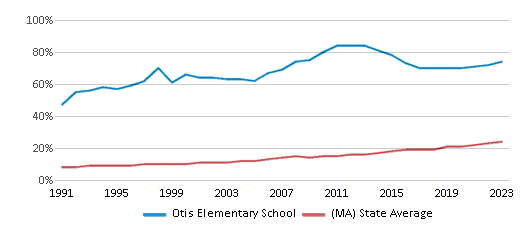
Black
2%
10%
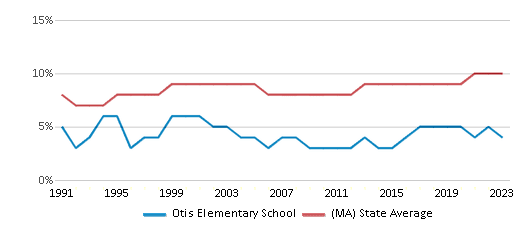
White
21%
53%
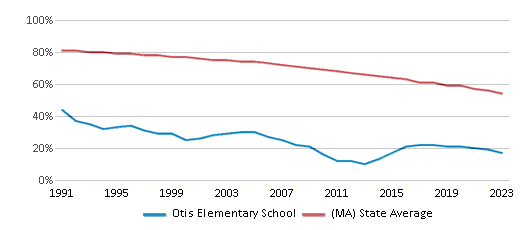
Hawaiian
n/a
n/a
Two or more races
2%
5%
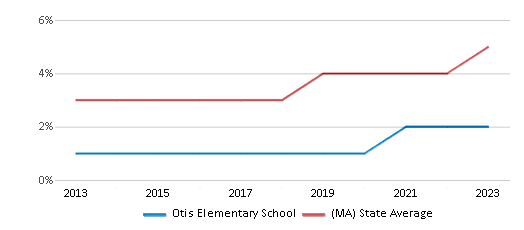
All Ethnic Groups
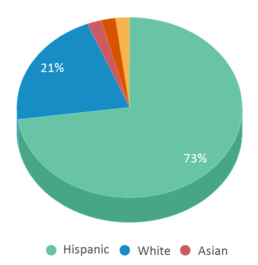
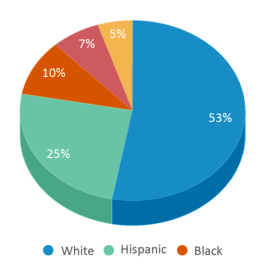
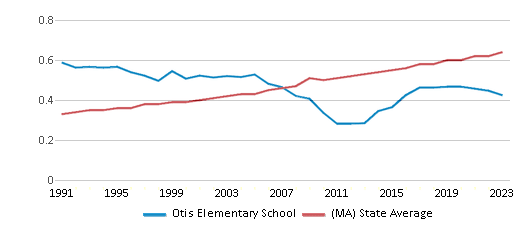
Participates in the National School Lunch Program (NSLP)
Yes
Eligible for Free Lunch
67%
35%
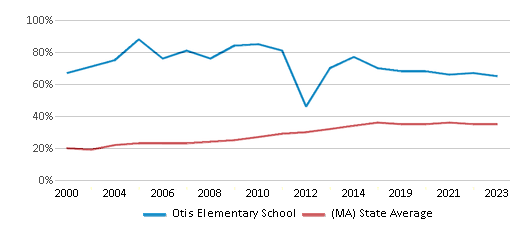
Eligible for Reduced Lunch (13-14)
2%
5%
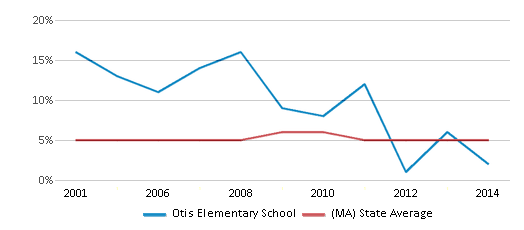
School Statewide Testing
School District Name
Source: National Center for Education Statistics (NCES), MA Dept. of Education
Profile last updated: 02/09/2025
Frequently Asked Questions
What is Otis Elementary School's ranking?
Otis Elementary School is ranked #1029 out of 1,631 schools, which ranks it among the bottom 50% of public schools in Massachusetts.
What percent of students have achieved state testing proficiency in math and reading?
35-39% of students have achieved math proficiency (compared to the 41% MA state average), while 30-34% of students have achieved reading proficiency (compared to the 44% MA state average).
How many students attend Otis Elementary School?
402 students attend Otis Elementary School.
What is the racial composition of the student body?
73% of Otis Elementary School students are Hispanic, 21% of students are White, 2% of students are Asian, 2% of students are Black, and 2% of students are Two or more races.
What is the student:teacher ratio of Otis Elementary School?
Otis Elementary School has a student ration of 13:1, which is higher than the Massachusetts state average of 12:1.
What grades does Otis Elementary School offer ?
Otis Elementary School offers enrollment in grades Prekindergarten-6 (offers virtual instruction).
What school district is Otis Elementary School part of?
Otis Elementary School is part of Boston School District.
School Reviews
2 9/28/2020
There is little to no diversity in the faculty that teaches, para's lunch room staff are majority people of color, this clearly shows students every day that those in power/higher up positions are white. I find it strange that the school is majority non-white and Spanish speaking. This is a Red lined school that has no library, gym, computer lab and for many years no playground. Education, paid for by all of us, should be equal. To my knowledge there is NO full-time psychologist, adjustment counselor, OT, SLP, or any other specialist that are housed in the building. This school is a clear example of school to prison pipeline dictated by redlined funding, and lack of advocacy from parents whose children attend. We can and should do better for our children, it's frustrating that there is a clear pattern of black and brown students in underperforming schools. Rant over.
Review Otis Elementary School. Reviews should be a few sentences in length. Please include any comments on:
- Quality of academic programs, teachers, and facilities
- Availability of music, art, sports and other extracurricular activities
Recent Articles

What Is A Charter School?
Explore the world of charter schools in this comprehensive guide. Learn about their history, how they operate, and the pros and cons of this educational innovation. Discover key facts about charter schools, including admission policies, demographics, and funding, as well as what to look for when considering a charter school for your child.

10 Reasons Why High School Sports Benefit Students
Discover the 10 compelling reasons why high school sports are beneficial for students. This comprehensive article explores how athletics enhance academic performance, foster personal growth, and develop crucial life skills. From improved fitness and time management to leadership development and community representation, learn why participating in high school sports can be a game-changer for students' overall success and well-being.

February 05, 2025
Understanding the U.S. Department of Education: Structure, Impact, and EvolutionWe explore how the Department of Education shapes American education, from its cabinet-level leadership to its impact on millions of students, written for general audiences seeking clarity on this vital institution.









